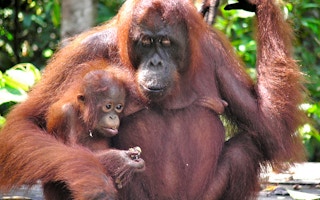The fate of a forest tract in Malaysia may have shifted dramatically in just the last few months.
For three years, a group of conservation NGOs in Sabah, a Malaysian state on the island of Borneo, has been working to keep the forests from an area known as Forest Management Unit 5 out of the sawmills.
And they appeared to be on the cusp of preserving one of the best-protected stands in Sabah harboring an important watershed, as well as orangutans, clouded leopards and gibbons. They had even sought collaboration with the company that owned the rights to exploit the area for timber.
But when that company suddenly sold those rights in October 2016, it took them completely by surprise, say the conservationists, demonstrating just how difficult the transition toward conservation can be.
“I thought we were all walking together,” said Cynthia Ong, executive director of the Sabah-based conservation NGO Land Empowerment Animals People (LEAP).
Ong was also leading the effort to protect “FMU5” from destruction by developing a self-sustaining economy to ensure its conservation over the long term. “But then someone chickened out,” she said
On October 19, the Sabah-based company Priceworth International, which manufactures wood products, announced that it had acquired logging and plantation development rights to FMU5 for 260 million ringgit (about $58.1 million) through its purchase of Anika Desiran from peninsular Malaysia-based Transkripsi Pintar. Anika Desiran owned the license to the forest concession.
Before that, FMU5, part of the Trus Madi Forest Reserve in central Sabah, looked like an ideal proving ground for alternatives to one of Sabah’s historical economic lynchpins, the timber industry.
“
I thought we were all walking together. But then someone chickened out.
Cynthia Ong, executive director, Land Empowerment Animals People (LEAP)
Ong and her colleagues at Forever Sabah, a broad-based initiative to move the state towards a circular economy that includes LEAP, thought that the old-style logging and plantation models would be a short-sighted use of the unique area.
Instead, they envisioned a future for FMU5 centered on a conservation economy integrated with reduced timber extraction: The area’s steep slopes would continue stocking carbon, shuttling water to the lowlands, and housing perhaps 250 to 300 Bornean orangutans (Pongo pygmaeus), according to a 2005 paper published by the online journal PLOS Biology. Bornean orangutans are listed as critically endangered by the International Union for the Conservation of Nature.
In response to the diminished timber stocks from traditionally managed forests, most of the companies that hold forest management unit concessions in Sabah signed on to work with Forever Sabah and the Sabah Forestry Department to explore new alternatives in 2015, Ong said.
They hoped that FMU5 would demonstrate that pairing these “conservation economy” elements with limited plantation timber production to generate high-value wood products such as bioplastics could help diversify income streams and provide the state with longer-term benefits.
A change in plans
According to a report prepared by Global Forestry Services, a compliance assessment firm based in Malaysia and the British Virgin Islands, Anika Desiran had mapped out plans to clear more than 49,000 hectares of FMU5’s forests to develop industrial tree plantations.
Ong and her colleagues contend that the undulating terrain isn’t cut out for this type of development, which typically involves replacing species-rich natural forest with a small handful of economically valuable tree species. The Forever Sabah team also says that the plantations would overlap with the important orangutan habitat found in FMU5.
In 1997 Anika Desiran secured a 100-year lease of FMU5, providing the legal right to harvest timber and clear about half of the 101,161-hectare (391-square-mile) tract for tree plantations. But over the past two decades, the company did little more than develop fewer than 500 hectares as rubber plantations.
So, in 2016, Forever Sabah teamed up with WWF Malaysia to conceptualise a conservation economy for FMU5. Sometimes also referred to as a “circular green economy,” the idea was to replace some of the income that the license holder would have gotten from harvesting the timber with carbon financing, payments to keep the water flowing for downstream communities and ecosystems along the Labuk and Kinabatangan Rivers, and a stake in “high-end” nature tourism.
They also planned to incorporate small-scale hydropower projects to generate electricity and well-managed tree plantations on the most degraded parts of FMU5.
The blueprint seemed in line with Sabah’s forward-thinking forestry department, Ong said.
“Sabah prides itself on being progressive and innovative and bold in its conservation steps,” she added. “It’s done some pretty groundbreaking things.”
This story was published with permission from Mongabay.com. Read the full story.










